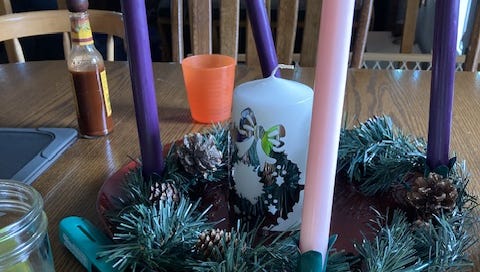It’s officially mid-December, the point at which the impending days of intense people time, the potential for conflict and noise, the undone to-do list, the presents squirreled away in closets, and my own dissolving self care routines, coalesce into me wanting to scream at the cognitive dissonance of it all.
Merry Christmas.
Ironically, this collision of my external and internal worlds is most likely to happen in this third week of Advent, the one in which we’re given the imperative, “Gaudete” - rejoice!
It’s not that I don’t want to rejoice, but that the sheer force of all the things, combined with story after story of people who are struggling or suffering, makes it feel impossible to slap a bow on it and cover it with tinsel. I’m an idealist through and through, but I also want things to be true. And “Christmas cheer” doesn’t feel true when the world is in shambles. When grocery pric…


